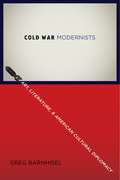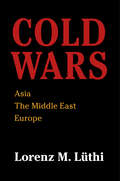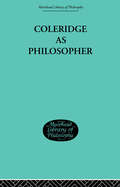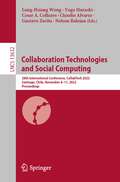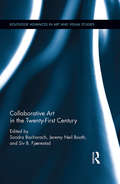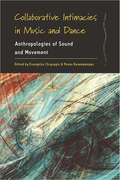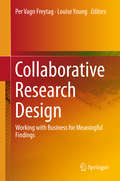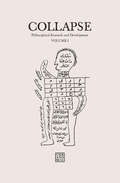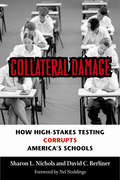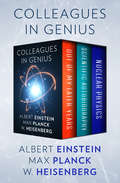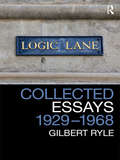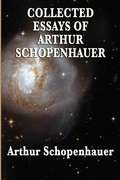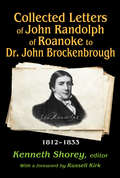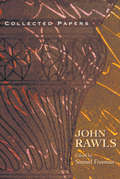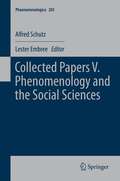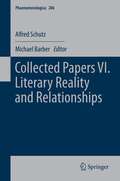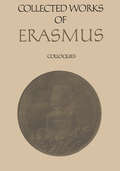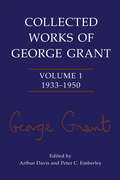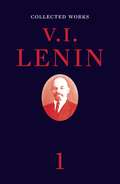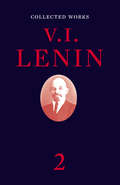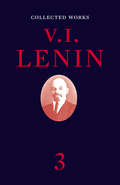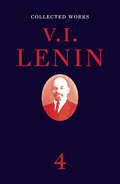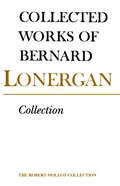- Table View
- List View
Cold War Modernists: Art, Literature, and American Cultural Diplomacy
by Greg BarnhiselEuropean intellectuals of the 1950s dismissed American culture as nothing more than cowboy movies and the A-bomb. In response, American cultural diplomats tried to show that the United States had something to offer beyond military might and commercial exploitation. Through literary magazines, traveling art exhibits, touring musical shows, radio programs, book translations, and conferences, they deployed the revolutionary aesthetics of modernism to prove—particularly to the leftists whose Cold War loyalties they hoped to secure—that American art and literature were aesthetically rich and culturally significant. Yet by repurposing modernism, American diplomats and cultural authorities turned the avant-garde into the establishment. They remade the once revolutionary movement into a content-free collection of artistic techniques and styles suitable for middlebrow consumption. Cold War Modernists documents how the CIA, the State Department, and private cultural diplomats transformed modernist art and literature into pro-Western propaganda during the first decade of the Cold War. Drawing on interviews, previously unknown archival materials, and the stories of such figures and institutions as William Faulkner, Stephen Spender, Irving Kristol, James Laughlin, and Voice of America, Barnhisel reveals how the U.S. government reconfigured modernism as a trans-Atlantic movement, a joint endeavor between American and European artists, with profound implications for the art that followed and for the character of American identity.
Cold Wars: Asia, the Middle East, Europe
by Lorenz M. LüthiWhat was the Cold War that shook world politics for the second half of the twentieth century? Standard narratives focus on Soviet-American rivalry as if the superpowers were the exclusive driving forces of the international system. Lorenz M. Lüthi offers a radically different account, restoring agency to regional powers in Asia, the Middle East and Europe and revealing how regional and national developments shaped the course of the global Cold War. Despite their elevated position in 1945, the United States, Soviet Union and United Kingdom quickly realized that their political, economic, and military power had surprisingly tight limits given the challenges of decolonization, Asian-African internationalism, pan-Arabism, pan-Islamism, Arab–Israeli antagonism, and European economic developments. A series of Cold Wars ebbed and flowed as the three world regions underwent structural changes that weakened or even severed their links to the global ideological clash, leaving the superpower Cold War as the only major conflict that remained by the 1980s.
Coleridge as Philosopher (Muirhead Library Of Philosophy Ser.)
by Muirhead, John HFirst published in 2002. Routledge is an imprint of Taylor & Francis, an informa company.
Collaboration Technologies and Social Computing: 28th International Conference, CollabTech 2022, Santiago, Chile, November 8–11, 2022, Proceedings (Lecture Notes in Computer Science #13632)
by Nelson Baloian Lung-Hsiang Wong Gustavo Zurita Yugo Hayashi Claudio Alvarez Cesar A. CollazosThis volume constitutes the proceedings of the 28th International Conference on Collaboration Technologies and Social Computing, CollabTech 2022, held in Santiago, Chile during November 8–11, 2022. The 18 full and 4 work-in-process papers presented in this volume were selected from 37 submissions and underwent careful double-blind peer review. The papers focus on innovative technical, human and organizational approaches to expand collaboration support including computer science, management science, design science, cognitive and social science.
Collaborative Art in the Twenty-First Century (Routledge Advances in Art and Visual Studies)
by Sondra Bacharach Siv B. Fjærestad Jeremy Neil BoothCollaboration in the arts is no longer a conscious choice to make a deliberate artistic statement, but instead a necessity of artistic survival. In today’s hybrid world of virtual mobility, collaboration decentralizes creative strategies, enabling artists to carve new territories and maintain practice-based autonomy in an increasingly commercial and saturated art world. Collaboration now transforms not only artistic practices but also the development of cultural institutions, communities and personal lifestyles. This book explores why collaboration has become so integrated into a greater understanding of creative artistic practice. It draws on an emerging generation of contributors—from the arts, art history, sociology, political science, and philosophy—to engage directly with the diverse and interdisciplinary nature of collaborative practice of the future.
Collaborative Intimacies in Music and Dance: Anthropologies of Sound and Movement (Dance and Performance Studies #10)
by Evangelos Chrysagis Panas KarampampasAcross spatial, bodily, and ethical domains, music and dance both emerge from and give rise to intimate collaboration. This theoretically rich collection takes an ethnographic approach to understanding the collective dimension of sound and movement in everyday life, drawing on genres and practices in contexts as diverse as Japanese shakuhachi playing, Peruvian huayno, and the Greek goth scene. Highlighting the sheer physicality of the ethnographic encounter, as well as the forms of sociality that gradually emerge between self and other, each contribution demonstrates how dance and music open up pathways and give shape to life trajectories that are neither predetermined nor teleological, but generative.
Collaborative Research Design: Working with Business for Meaningful Findings
by Louise Young Per Vagn FreytagThis book articulates and interconnects a range of research methods for the investigation of business management processes. It introduces new directions that both recognise the business community as stakeholders in the research process and seek to include them in that process. The book presents a range of contemporary research methods with particular focus on those that allow insights into business managers' thoughts and behaviours. It includes fresh views on traditional research designs, for example new approaches to using literature reviews, experiments, interviews and observation studies. It also considers cutting-edge research methods, such as the use of vignettes, workshops, improvisation and theatre, as well as computer-based simulation. In addition to discussing new approaches to data capture and data generation, it presents new methods of data analysis by considering various forms of models and modelling, new forms of computer-aided text analysis and innovative approaches to data display. Finally, the book provides a link between the philosophical underpinnings of research and the different research methods presented. This is often neglected but undertaking the knowledge-generating journey that is research includes having a view on reality and marrying this to beliefs about how the reality to be investigated can be best expedited.
Collapse: Philosophical Research and Development (Urbanomic #Vol. 1)
by Robin MackayAn investigation of the nature and philosophical uses of number. The first volume of Collapse investigates the nature and philosophical uses of number. The volume includes an interview with Alain Badiou on the relation between philosophy, mathematics, and science, an in-depth interview with mathematician Matthew Watkins on the strange connections between physics and the distribution of prime numbers, and contributions that demonstrate the many ways in which number intersects with philosophical thought—from the mathematics of intensity to terrorism, from occultism to information theory, and graphical works of multiplicity.
Collateral Damage: How High-Stakes Testing Corrupts America's Schools
by David C. Berliner Nel Noddings Sharon L. NicholsDrawing on their extensive research, Nichols and Berliner document and categorize the ways that high-stakes testing threatens the purposes and ideals of the American education system. For more than a decade, the debate over high-stakes testing has dominated the field of education. This passionate and provocative book provides a fresh perspective on the issue and powerful ammunition for opponents of high-stakes tests. Their analysis is grounded in the application of Campbell's Law, which posits that the greater the social consequences associated with a quantitative indicator (such as test scores), the more likely it is that the indicator itself will become corrupted--and the more likely it is that the use of the indicator will corrupt the social processes it was intended to monitor. Nichols and Berliner illustrate both aspects of this "corruption," showing how the pressures of high-stakes testing erode the validity of test scores and distort the integrity of the education system. Their analysis provides a coherent and comprehensive intellectual framework for the wide-ranging arguments against high-stakes testing, while putting a compelling human face on the data marshalled in support of those arguments.
Collateral Damage: How High-Stakes Testing Corrupts America's Schools
by David C. Berliner Sharon L. NicholsDrawing on their extensive research, Nichols and Berliner document and categorize the ways that high-stakes testing threatens the purposes and ideals of the American education system. For more than a decade, the debate over high-stakes testing has dominated the field of education. This passionate and provocative book provides a fresh perspective on the issue and powerful ammunition for opponents of high-stakes tests. Their analysis is grounded in the application of Campbell&’s Law, which posits that the greater the social consequences associated with a quantitative indicator (such as test scores), the more likely it is that the indicator itself will become corrupted—and the more likely it is that the use of the indicator will corrupt the social processes it was intended to monitor. Nichols and Berliner illustrate both aspects of this &“corruption,&” showing how the pressures of high-stakes testing erode the validity of test scores and distort the integrity of the education system. Their analysis provides a coherent and comprehensive intellectual framework for the wide-ranging arguments against high-stakes testing, while putting a compelling human face on the data marshalled in support of those arguments.
Colleagues in Genius: Out of My Later Years, Scientific Autobiography, and Nuclear Physics
by Albert Einstein W. Heisenberg Max PlanckThese three works by Nobel Prize–winning physicists offer an enlightening window into the scientific minds that changed the twentieth century. With their discoveries and formulations, Albert Einstein, Max Planck, and Werner Heisenberg ushered the world into the Nuclear Age. As colleagues, they often corresponded, sharing insights and championing each other&’s work. In the three volumes collected here, they discuss their thoughts about life, science, politics, and how they approached their revolutionary work. Out of My Later Years by Albert Einstein: Perhaps the most celebrated scientist of the twentieth century, Albert Einstein was also a philosopher and outspoken humanitarian. Collected here are some of his most insightful essays, articles, letters, and speeches written between 1934 and 1950. Accessible and fascinating, these works reflect the broad sweep of Einstein&’s intellectual concerns, from scientific inquiry to Jewish identity; and from global politics to the great minds he knew and admired. Scientific Autobiography by Max Planck: The founder of quantum theory, Max Planck revolutionized our understanding of atomic and subatomic behavior. Born in Germany in 1858, he lived a long and eventful life at the center of both scientific advancement and global events. From the childhood epiphany that inspired him to pursue a life in science, to the great discoveries he made amidst terrifying political turmoil, Planck tells his story in this illuminating autobiography. Nuclear Physics by W. Heisenberg: Werner Heisenberg is famous for developing the uncertainty principle, which bears his name, and for his pioneering work in quantum mechanics. In Nuclear Physics, he offers an accessible introduction to the subject based on his own lectures. Beginning with a short history of atomic physics, he delves into the nature of nuclear forces and reactions, the tools of nuclear physics, and its world-changing technical and practical applications.
Collected Essays 1929 - 1968: Collected Papers Volume 2
by Gilbert RyleGilbert Ryle was one of the most important and yet misunderstood philosophers of the Twentieth Century. Long unavailable, Collected Essays 1929-1968: Collected Papers Volume 2 stands as testament to the astonishing breadth of Ryle’s philosophical concerns. This volume showcases Ryle’s deep interest in the notion of thinking and contains many of his major pieces, including his classic essays ‘Knowing How and Knowing That’, ‘Philosophical Arguments’, ‘Systematically Misleading Expressions’, and ‘A Puzzling Element in the Notion of Thinking’. He ranges over an astonishing number of topics, including feelings, pleasure, sensation, forgetting and concepts and in so doing hones his own philosophical stance, steering a careful path between behaviourism and Cartesianism. Together with the Collected Papers Volume 1 and the new edition of The Concept of Mind, these outstanding essays represent the very best of Ryle’s work. Each volume contains a substantial preface by Julia Tanney, and both are essential reading for any student of twentieth-century philosophies of mind and language. Gilbert Ryle (1900 -1976) was Waynflete Professor of Metaphysics and Fellow of Magdalen College Oxford, an editor of Mind, and a president of the Aristotelian Society. Julia Tanney is Senior Lectuer at the University of Kent, and has held visiting positions at the University of Picardie and Paris-Sorbonne.
Collected Essays of Arthur Schopenhauer
by Arthur SchopenhauerCollected here are fourty-two short essays, previously published as seven separate books, Councils and Maxims, On Human Nature, On Religion, Studies in Pessimism, The Art of Controversy, The Art of Literature, and The Wisdom of Life. This is the most complete collection available from the world renowned philosopher Arthur Schopenhauer.
Collected Letters of John Randolph of Roanoke to Dr. John Brockenbrough: 1812-1833 (The Library of Conservative Thought)
by Kenneth ShoreyThis volume presents a complete collection of correspondence between John Randolph of Roanoke, Virginia, and his close friend Dr. John Brockenbrough, a Richmond physician. Randolph was an eloquent man, the most talented extemporaneous speaker of the House of Representatives in his day and often wrote biting social commentatary. Of special interest in this collection are his critical comments on Thomas Jefferson, James Madison, James Monroe, John Adams, John Quincy Adams, Henry Clay, John Marshall, and many other leading figures of the period. Randolph's correspondence with Brockenbrough touches upon the principal political controversies of his time, from the War of 1812 to South Carolina's Nullification Crisis of 1832.From the trial of Aaron Burr until his fantastic end in a Philadelphia hotel, John Randolph confided in John Brockenbrough. This book records the friendship of a gifted politician and a sober physician. It also reveals a great deal about an era of American history that ought to be studied more closely.
Collected Papers
by John RawlsJohn Rawls’s work on justice has drawn more commentary and aroused wider attention than any other work in moral or political philosophy in the twentieth century. Rawls is the author of two major treatises, A Theory of Justice (1971) and Political Liberalism (1993); it is said that A Theory of Justice revived political philosophy in the English-speaking world. But before and after writing his great treatises Rawls produced a steady stream of essays. Some of these essays articulate views of justice and liberalism distinct from those found in the two books. They are important in and of themselves because of the deep issues about the nature of justice, moral reasoning, and liberalism they raise as well as for the light they shed on the evolution of Rawls’s views. Some of the articles tackle issues not addressed in either book. They help identify some of the paths open to liberal theorists of justice and some of the knotty problems which liberal theorists must seek to resolve. A complete collection of John Rawls’s essays is long overdue.
Collected Papers V. Phenomenology and the Social Sciences (Phaenomenologica #205)
by Lester Embree Alfred SchutzThis book shows how phenomenology of the social sciences differs from positivistic approaches, and presents Schutz's theory of relevances--a key feature of his own phenomenology of the social world. It begins with Schutz's appraisal of how Husserl influenced him, and continues with exchanges between Schutz and Eric Voegelin, Felix Kaufmann, Aron Gurwitsch, and Talcott Parsons. This book presents, for the first time, Schutz's incisive criticisms of T.S. Eliot's theory of culture.
Collected Papers VI. Literary Reality and Relationships (Phaenomenologica #206)
by Alfred Schutz Michael BarberThis book contains texts devoted by Alfred Schutz to the "normative" areas of literature and ethics. It includes writings dealing with the author-reader relationship, multiple realities, the literary province of meaning, and Schutz's views on equality. Never published in English commentaries on Goethe's novel and the account of personality in the social world appear in this volume.
Collected Works of Erasmus Volume 39 and Volume 40
by Desiderius Erasmus Craig R. ThompsonErasmus's familiar colloquies grew from a small collection of phrases, sentences, and snatches of dialogue written in Paris about 1497 to help his private pupils improve their command of Latin. Twenty years later the material was published by Johann Froben (Basel 1518). It was an immediate success and was reprinted thirty times in the next four years. For the edition of March 1522 Erasmus began to add fully developed dialogues, and a book designed to improve boys' use of Latin (and their deportment) soon became a work of literature for adults, although it retained traces of its original purposes. The final Froben edition (March, 1533) had about sixty parts, most of them dialogues.<P><P> It was in the last form that the Colloquies were read and enjoyed for four centuries. For modern readers it is one of the best introductions to European society of the Renaissance and Reformation periods, with lively descriptions of daily life and provocative discussions of political, religious, social, and literary topics, presented with Erasmus's characteristic wit and verve. Each colloquy has its own introduction and full explanatory, historical, and biographical notes.
Collected Works of George Grant, Volume 4, 1970 - 1988
by George Grant Arthur Davis Henry Roper Roper Sheila GrantGeorge Grant (1918-88) has often been called Canada's greatest political philosopher and his work continues to influence the country's political, social, and cultural discourse and institutions. The fourth and final volume of the Collected Works of George Grant contains his writings from the last period of his life and includes unpublished material such as lectures, interviews, and excerpts from his notebooks.<P><P> With comprehensive annotations for his articles, reviews, and the three books he published during this period - Time as History, English-Speaking Justice, and Technology and Justice - the volume also contains his writings on Nietzsche, Heidegger Simone Weil, and Céline that were central to this phase of his thought. Volume 4 reveals his engagement with technology and the nature of technological society that is as insightful today as during Grant's lifetime and is lasting proof of his legacy.<P> Arthur Davis is Associate Professor in the School of Social Sciences, Atkinson Faculty of Liberal and Professional Studies, York University. During the 1950's, he studied undergraduate philosophy with George Grant.
Collected Works of George Grant: Volume 1 (1933-1950)
by George Grant Arthur Davis Peter C. EmberleyMore than a decade after his death, George Grant continues to stimulate, challenge, and inspire. During his lifetime he influenced a broad cross-section of Canadians, urging them to think more deeply about matters of social justice and individual responsibility. He wrote on subjects as diverse as technology, abortion, Canadian politics and nationalism, and the war in Vietnam, and was claimed equally by rightist and leftist causes.Grant's legacy includes six books and more than two hundred articles, as well as numerous broadcast transcripts, extensive correspondence, and a wealth of unpublished lectures, essays, and notes. In this projected eight-volume series, Grant's published and unpublished writings, including his complete correspondence, will be brought together for the first time. The texts are annotated, and each volume includes an introduction to the period that it covers. The series will not only make it possible to see the whole pattern of Grant's thought, but will also invite a reconsideration of the nature and importance of his work.Volume I covers Grant's intellectual development through his student years. Included are his early reviews, a brief journal written as he recovered from tuberculosis in 1942, and his earliest social and political writings about Canadian and international affairs. The most important of Grant's formative years were those spent at Oxford after the war, culminating in the writing of his DPhil thesis on the Scottish philosopher John Oman. In this dissertation, published here in full, we see the main themes of Grant's thought worked out for the first time.
Collected Works, Volume 1
by V. I. LeninAmong the most influential political and social forces of the twentieth century, modern communism rests firmly on philosophical, political, and economic underpinnings developed by Vladimir Ilyich Ulyanov, later known as Lenin. For anyone who seeks to understand the twentieth century, capitalism, the Russian Revolution, and the role of Communism in the tumultuous political and social movements that have shaped the modern world, the works of Lenin offer unparalleled insight and understanding. Taken together, they represent a balanced cross-section of his revolutionary theories of history, politics, and economics; his tactics for securing and retaining power; and his vision of a new social and economic order.This first volume contains four works (“New Economic Developments in Peasant Life,” “On the So-Called Market Question,” “What the ‘Friends of the People’ Are and How They Fight the Social- Democrats,” “The Economic Content of Narodism and the Criticism of It in Mr. Struve’s Book”) written by Lenin in 1893–1894, at the outset of his revolutionary activity, during the first years of the struggle to establish a workers’ revolutionary party in Russia.
Collected Works, Volume 2
by V. I. LeninRe-launch of the Collected Works of the legendary revolutionary in paperbackAmong the most influential political and social forces of the twentieth century, modern communism rests firmly on philosophical, political, and economic underpinnings developed by Vladimir Ilyich Ulyanov, later known as Lenin. For anyone who seeks to understand the twentieth century, capitalism, the Russian Revolution, and the role of Communism in the tumultuous political and social movements that have shaped the modern world, the works of Lenin offer unparalleled insight and understanding. Taken together, they represent a balanced cross-section of his revolutionary theories of history, politics, and economics; his tactics for securing and retaining power; and his vision of a new social and economic orderThis second volume contains Lenin’s works from 1895 to 1897. Included are Lenin’s early economic and political writings, as well as his prescriptions for the program and strategy of Russian Marxism.
Collected Works, Volume 3
by V. I. LeninRe-launch of the Collected Works of the legendary revolutionary in paperbackAmong the most influential political and social forces of the twentieth century, modern communism rests firmly on philosophical, political, and economic underpinnings developed by Vladimir Ilyich Ulyanov, later known as Lenin. For anyone who seeks to understand capitalism, the Russian Revolution, and the role of communism in the tumultuous political and social movements that have shaped the modern world, the works of Lenin offer unparalleled insight and understanding.
Collected Works, Volume 4
by V. I. LeninRe-launch of the Collected Works of the legendary revolutionary in paperbackAmong the most influential political and social forces of the twentieth century, modern communism rests firmly on philosophical, political, and economic underpinnings developed by Vladimir Ilyich Ulyanov, later known as Lenin. For anyone who seeks to understand capitalism, the Russian Revolution, and the role of communism in the tumultuous political and social movements that have shaped the modern world, the works of Lenin offer unparalleled insight and understanding.
Collection: Volume 4
by Bernard Lonergan Robert Doran, S.J. Frederick Crowe, S.J.Collection contains short works that span Lonergan's work from 1943 to 1965. The papers deal with scientific, mathematical, theological, and philosophical questions, including discussions of such topics as the proper foundation of metaphysics, the form of inference, the nature of love and marriage, and the role of the university in the modern world.
